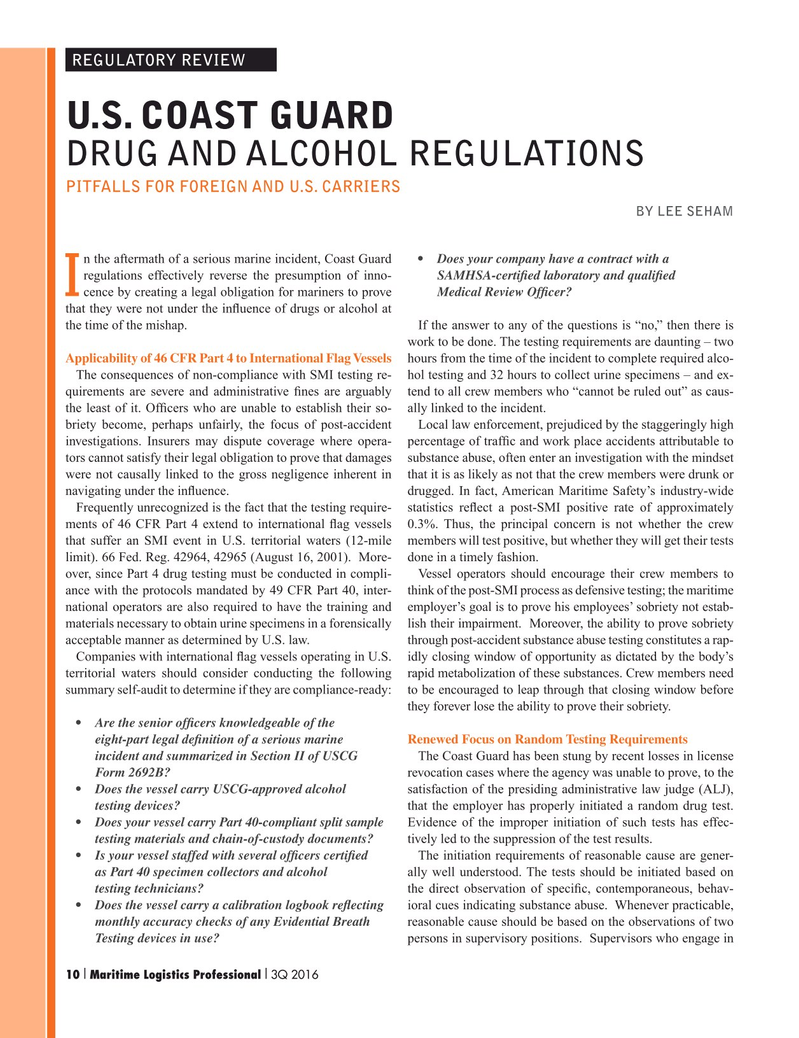
Page 10: of Maritime Logistics Professional Magazine (Q3 2016)
Shipbuilding, Repair & Maintenance
Read this page in Pdf, Flash or Html5 edition of Q3 2016 Maritime Logistics Professional Magazine
REGULATORY REVIEW
U.S. COAST GUARD
DRUG AND ALCOHOL REGULATIONS
PITFALLS FOR FOREIGN AND U.S. CARRIERS
BY LEE SEHAM n the aftermath of a serious marine incident, Coast Guard • Does your company have a contract with a regulations effectively reverse the presumption of inno- SAMHSA-certi? ed laboratory and quali? ed
Icence by creating a legal obligation for mariners to prove Medical Review Of? cer?
that they were not under the in? uence of drugs or alcohol at the time of the mishap. If the answer to any of the questions is “no,” then there is work to be done. The testing requirements are daunting – two
Applicability of 46 CFR Part 4 to International Flag Vessels hours from the time of the incident to complete required alco-
The consequences of non-compliance with SMI testing re- hol testing and 32 hours to collect urine specimens – and ex- quirements are severe and administrative ? nes are arguably tend to all crew members who “cannot be ruled out” as caus- the least of it. Of? cers who are unable to establish their so- ally linked to the incident.
briety become, perhaps unfairly, the focus of post-accident Local law enforcement, prejudiced by the staggeringly high investigations. Insurers may dispute coverage where opera- percentage of traf? c and work place accidents attributable to tors cannot satisfy their legal obligation to prove that damages substance abuse, often enter an investigation with the mindset were not causally linked to the gross negligence inherent in that it is as likely as not that the crew members were drunk or navigating under the in? uence. drugged. In fact, American Maritime Safety’s industry-wide
Frequently unrecognized is the fact that the testing require- statistics re? ect a post-SMI positive rate of approximately ments of 46 CFR Part 4 extend to international ? ag vessels 0.3%. Thus, the principal concern is not whether the crew that suffer an SMI event in U.S. territorial waters (12-mile members will test positive, but whether they will get their tests limit). 66 Fed. Reg. 42964, 42965 (August 16, 2001). More- done in a timely fashion.
over, since Part 4 drug testing must be conducted in compli- Vessel operators should encourage their crew members to ance with the protocols mandated by 49 CFR Part 40, inter- think of the post-SMI process as defensive testing; the maritime national operators are also required to have the training and employer’s goal is to prove his employees’ sobriety not estab- materials necessary to obtain urine specimens in a forensically lish their impairment. Moreover, the ability to prove sobriety acceptable manner as determined by U.S. law. through post-accident substance abuse testing constitutes a rap-
Companies with international ? ag vessels operating in U.S. idly closing window of opportunity as dictated by the body’s territorial waters should consider conducting the following rapid metabolization of these substances. Crew members need summary self-audit to determine if they are compliance-ready: to be encouraged to leap through that closing window before they forever lose the ability to prove their sobriety.
• Are the senior of? cers knowledgeable of the eight-part legal de? nition of a serious marine Renewed Focus on Random Testing Requirements incident and summarized in Section II of USCG The Coast Guard has been stung by recent losses in license Form 2692B? revocation cases where the agency was unable to prove, to the • Does the vessel carry USCG-approved alcohol satisfaction of the presiding administrative law judge (ALJ), testing devices? that the employer has properly initiated a random drug test. • Does your vessel carry Part 40-compliant split sample Evidence of the improper initiation of such tests has effec- testing materials and chain-of-custody documents? tively led to the suppression of the test results.
• Is your vessel staffed with several of? cers certi? ed The initiation requirements of reasonable cause are gener- as Part 40 specimen collectors and alcohol ally well understood. The tests should be initiated based on testing technicians? the direct observation of speci? c, contemporaneous, behav- • Does the vessel carry a calibration logbook re? ecting ioral cues indicating substance abuse. Whenever practicable, monthly accuracy checks of any Evidential Breath reasonable cause should be based on the observations of two Testing devices in use? persons in supervisory positions. Supervisors who engage in 10 Maritime Logistics Professional 3Q 2016I I 1-17 Q3 MP2016.indd 10 8/17/2016 11:44:45 AM

 9
9

 11
11
